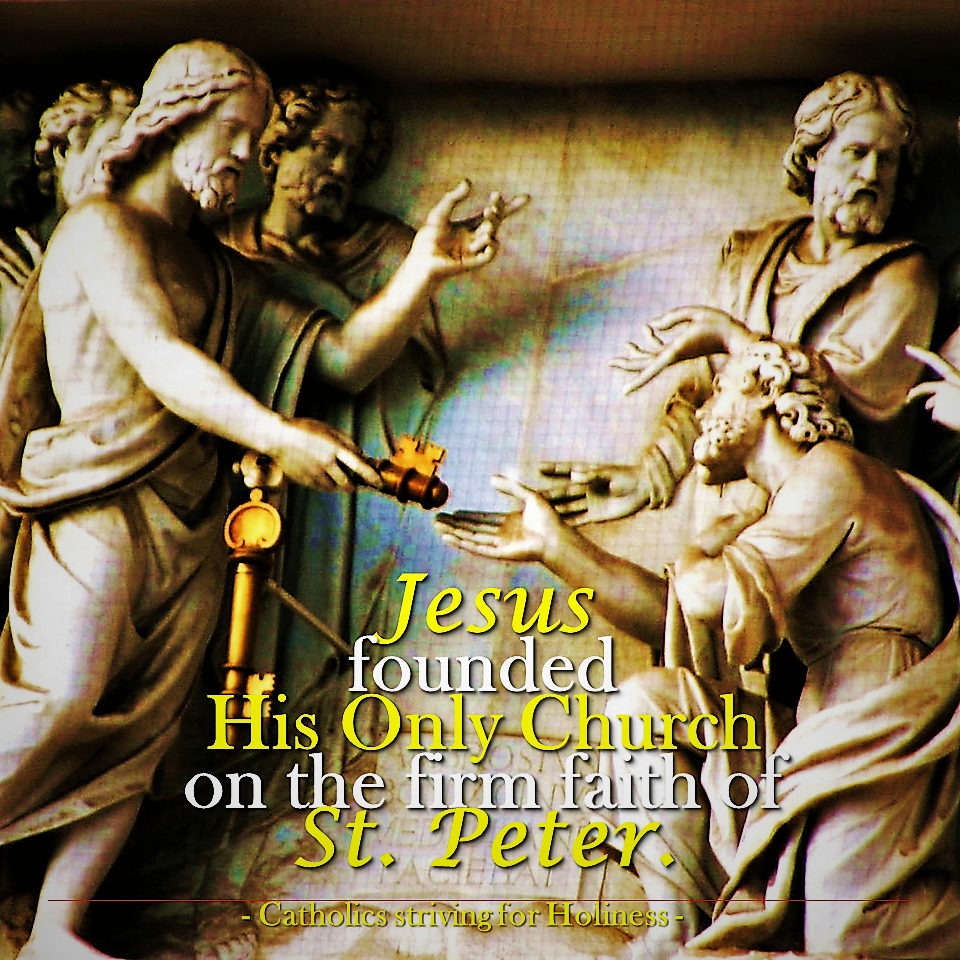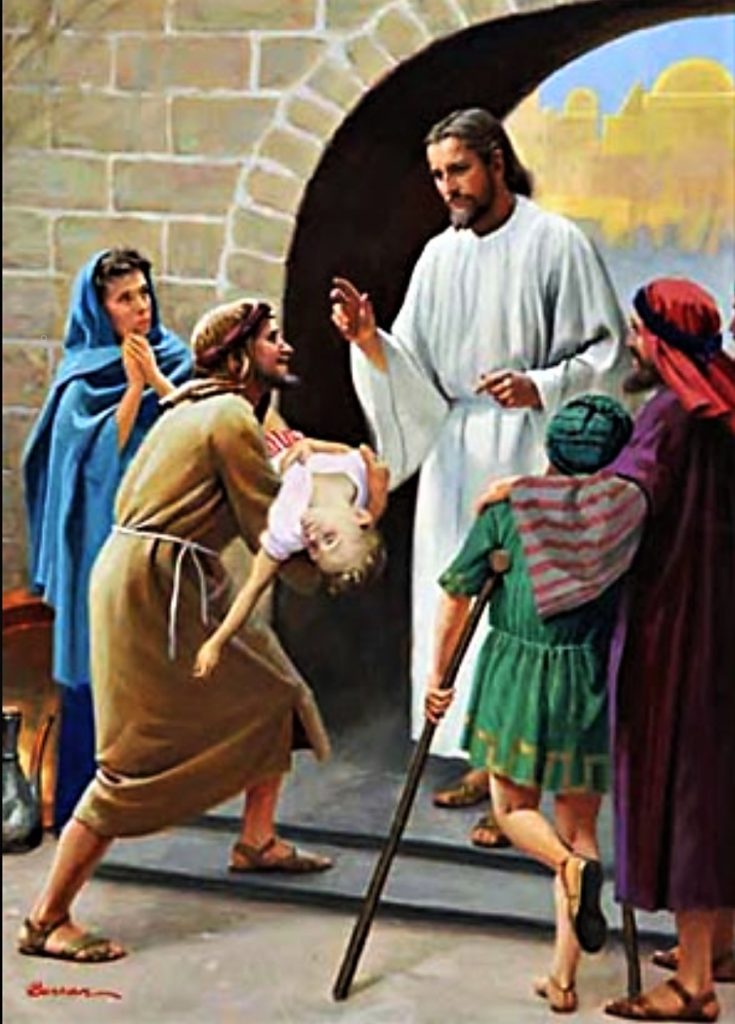DAILY GOSPEL COMMENTARY. “YOU ARE THE CHRIST, THE SON OF THE LIVING GOD.” (Mt 16:13-23).

1. THURSDAY, 18TH WEEK IN ORDINARY TIME GOSPEL READING: Mt 16:13–23
When Jesus went into the region of Caesarea Philippi he asked his disciples, “Who do people say that the Son of Man is?” They replied, “Some say John the Baptist, others Elijah, still others Jeremiah or one of the prophets.” He said to them, “But who do you say that I am?” Simon Peter said in reply, “You are the Christ, the Son of the living God.” Jesus said to him in reply, “Blessed are you, Simon son of Jonah. For flesh and blood has not revealed this to you, but my heavenly Father. And so I say to you, you are Peter, and upon this rock I will build my Church, and the gates of the netherworld shall not prevail against it. I will give you the keys to the Kingdom of heaven. Whatever you bind on earth shall be bound in heaven; and whatever you loose on earth shall be loosed in heaven.”
Then he strictly ordered his disciples to tell no one that he was the Christ.
From that time on, Jesus began to show his disciples that he must go to Jerusalem and suffer greatly from the elders, the chief priests, and the scribes, and be killed and on the third day be raised. Then Peter took Jesus aside and began to rebuke him, “God forbid, Lord! No such thing shall ever happen to you.” He turned and said to Peter, “Get behind me, Satan! You are an obstacle to me. You are thinking not as God does, but as human beings do.”
COMMENTARY OF SCOTT HAHN:
Petros (Gk.): A masculine noun meaning “rock” or “stone”. Although a common word in Greek, there is no evidence that Peter was ever a proper name before Jesus renamed Simon. This accentuates the symbolism of the name: Simon is himself the rock upon which Jesus builds the Church.
- Further NT evidence suggests that Jesus’ words to Peter were originally spoken in Aramaic. In this language, the word kepha is the equivalent of Peter and denotes a “sizeable rock”—one suitable as a building foundation.
- This Aramaic name is preserved as “Cephas” 9 times in the NT (Jn 1:42; 1 Cor 1:12; 15:5; Gal 1:18; 2:9, etc.). At another level, Simon’s name change recalls the OT episodes where God renamed Abram as Abraham (Gen 17:5) and Jacob as Israel (Gen 32:28).
- Peter now stands in this biblical tradition where new names signify new God-given roles in salvation history. In Peter’s case, Jesus designates him the foundation stone of the New Covenant Church. Just as the Temples of the OT were built upon a great stone (1 Kings 5:17; Ezra 3:10), so Jesus builds his NT Church upon the foundational rock of Peter (cf. Eph 2:20; Rev 21:14).
COMMENTARY OF THE NAVARRE BIBLE, GOSPEL OF ST. MATTHEW (with permission)
13-20: In this passage St Peter is promised primacy over the whole Church, a primacy which Jesus will confer on him after his Resurrection, as we learn in the Gospel of St John (cf. Jn 21:15-18).
- In this passage St Peter is promised primacy over the whole Church, a primacy which Jesus will confer on him after his Resurrection, as we learn in the Gospel of St John (cf. Jn 21:15-18).
- This supreme authority is given to Peter for the benefit of the Church. Because the Church has to last until the end of time, this authority will be passed on to Peter’s successors down through history.
- The Bishop of Rome, the Pope, is the successor of Peter. (Commentary to the Gospel of St. Matthew, Navarre Bible)
The solemn Magisterium of the Church, in the First Vatican Council, definitively defined the doctrine of the primacy of Peter and his successors in these terms:
- “We teach and declare, therefore, according to the testimony of the Gospel that the primacy of jurisdiction over the whole Church was immediately and directly promised to and conferred upon the blessed Apostle Peter by Christ the Lord. For to Simon, Christ had said, ‘You shall be called Cephas’ (Jn 1:42). Then, after Simon had acknowledged Christ with the confession, ‘You are the Christ, the Son of the living God’ (Mt 16:16), it was to Simon alone that the solemn words were spoken by the Lord: ‘Blessed are you, Simon Bar-Jona. For flesh and blood has not revealed this to you, but my Father who is in heaven. And I tell you, you are Peter, and on this rock I will build my church, and the powers of hell shall not prevail against it. I will give you the keys of the kingdom of heaven, and whatever you bind on earth shall be bound in heaven, and what you loose on earth shall be loosed in heaven’ (Mt 16: 1 7-19). And after his Resurrection, Jesus conferred upon Simon Peter alone the jurisdiction of supreme shepherd and ruler over his whole fold with the words, ‘Feed my lambs. . .. Feed my sheep’ (Jn 21:15-17)…. (Canon) Therefore, if anyone says that the blessed Apostle Peter was not constituted by Christ the Lord as the Prince of all the Apostles and the visible head of the whole Church militant, or that he received immediately and directly from Jesus Christ our Lord only a primacy of honour and not a true and proper primacy of jurisdiction: let him be anathema.
- “Now, what Christ the Lord, supreme shepherd and watchful guardian of the flock, established in the person of the blessed Apostle Peter for the perpetual safety and everlasting good of the Church must, by the will of the same, endure without interruption in the Church which was founded on the rock and which will remain firm until the end of the world. Indeed, ‘no one doubts, in fact it is obvious to all ages, that the holy and most blessed Peter, Prince and head of the Apostles, the pillar of faith, and the foundation of the Catholic Church, received the keys of the kingdom from our Lord Jesus Christ, the Saviour and the Redeemer of the human race; and even to this time and forever he lives,’ and governs, ‘and exercises judgment in his successors’ (cf. Council of Ephesus), the bishops of the holy Roman See, which he established and consecrated with his blood. Therefore, whoever succeeds Peter in this Chair holds Peter’s primacy over the whole Church according to the plan of Christ himself …
- “For this reason, ‘because of its greater sovereignty,’ it was always ‘necessary for every church, that is, the faithful who are everywhere, to be in agreement’ with the same Roman Church…
- “(Canon) Therefore, if anyone says that it is not according to the institution of Christ our Lord himself, that is, by divine law, that St Peter has perpetual successors in the primacy over the whole Church; or if anyone says that the Roman Pontiff is not the successor of St Peter in the same primacy: let him be anathema.
- “. . . We think it extremely necessary to assert solemnly the prerogative which the only-begotten Son of God deigned to join to the highest pastoral office.
- “And so, faithfully keeping to the tradition received from the beginning of the Christian faith, for the glory of God our Saviour, for the exaltation of the Catholic religion, and for the salvation of Christian peoples, We, with the approval of the sacred council, teach and define that it is a divinely revealed dogma: that the Roman Pontiff, when he speaks ex cathedra, that is, when, acting in the office of shepherd and teacher of all Christians, he defines, by virtue of his supreme apostolic authority, doctrine concerning faith or morals to be held by the universal Church, possesses through the divine assistance promised to him in the person of St Peter, the infallibility with which the divine Redeemer willed his Church to be endowed in defining doctrine concerning faith or morals; and that such definitions of the Roman Pontiff are therefore irreformable because of their nature, but not because of the agreement of the Church.
- “(Canon) But if anyone presumes to contradict this our definition (God forbid that he do so): let him be anathema” (Vatican I, Pastor aeternus, chaps. 1, 2 and 4).
- Jesus foretells his Passion and Resurrection
- 23 Jesus vigorously rejects St Peter’s well-intentioned protestations, giving us to understand the capital importance of accepting the cross if we are to attain salvation (cf. 1 Cor 1:23-25). Shortly before this (Mt 16:17) Jesus had promised Peter: “Blessed are you, Simon”; now he reproves him: “Get behind me, Satan”; in the former case Peter’s words were inspired by the Holy Spirit, whereas what he says now comes from his own spirit which has not yet sloughed off.
VIDEO COMMENTARY
TOPIC: HOW DO YOU KNOW IF YOU HAVE CHANGED FOR THE BETTER?
In today’s gospel reading, Jesus’ real identity is revealed and proclaimed here, for He was not only for the Jews, his people, but for the whole humanity. We also see Peter and his two persona. At first, he shows great insight and perceptiveness. He calls Jesus the Son of the Living God. And Jesus responds by calling him the Rock on which His church will be built on. However, Peter reproaches Jesus for mentioning about His impending suffering and death. Jesus makes a swift turnaround from praise to rebuke. He chastises Peter for being an obstacle to His mission. We reflect today on how we are like Peter in many ways.
Stay updated: subscribe by email for free TO OUR NEW WEBSITE www.catholicsstrivingforholiness.org (PUT YOUR EMAIL IN THE SUBSCRIBE WIDGET).
We are also in www.fb.com/Catholicsstrivingforholiness. Kindly help more people in their Christian life by liking our page and inviting your family, friends and relatives to do so as well. Thanks in advance and God bless you and your loved ones! Fr. Rolly Arjonillo
